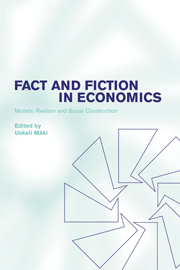Book contents
- Frontmatter
- Contents
- Notes on the contributors
- Preface
- I Introduction
- II Setting the scene
- III Economic models and economic reality
- IV The constitution of economic reality
- V The institutions of economics
- 16 You shouldn't want a realism if you have a rhetoric
- 17 The more things change, the more they stay the same: social realism in contemporary science studies
- 18 Economists: truth-seekers or rent-seekers?
- Index
- References
17 - The more things change, the more they stay the same: social realism in contemporary science studies
Published online by Cambridge University Press: 22 September 2009
- Frontmatter
- Contents
- Notes on the contributors
- Preface
- I Introduction
- II Setting the scene
- III Economic models and economic reality
- IV The constitution of economic reality
- V The institutions of economics
- 16 You shouldn't want a realism if you have a rhetoric
- 17 The more things change, the more they stay the same: social realism in contemporary science studies
- 18 Economists: truth-seekers or rent-seekers?
- Index
- References
Summary
Introduction
The demise of the so-called Received View within mainstream philosophy of science and the subsequent Kuhnian and Quinean revolutions have left contemporary science theory in a state of relative disarray. While there are many different responses to this malaise – evolutionary epistemology, various naturalisms, and the revival of pragmatism, for example – the one that will be examined here is an approach to scientific knowledge that has evolved independently of such philosophical developments. The approach is constructivism, or the sociological turn, and while it remains controversial, it is certainly one of the main competing frameworks within contemporary science theory. Although a wide range of different programs fall under the broad constructivist rubric, some common themes clearly emerge from all of these different approaches. Most importantly, constructivism replaces armchair a priori philosophy, but unlike certain naturalistic approaches, it replaces it with inquiries into the social characteristics of the knowledge production (and legitimization) process. According to constructivists, science is fundamentally social, and for many this means that science, and scientists, should be studied in essentially the same way that one would study any other social or cultural phenomenon: using the tools of the human and social sciences. Both the philosophy of science and the self-descriptions of those within the scientific community tell us that legitimate scientific beliefs are determined exclusively by nature: that the “scientific method” is a procedure that allows privileged access to the voice of nature.
- Type
- Chapter
- Information
- Fact and Fiction in EconomicsModels, Realism and Social Construction, pp. 341 - 355Publisher: Cambridge University PressPrint publication year: 2002



